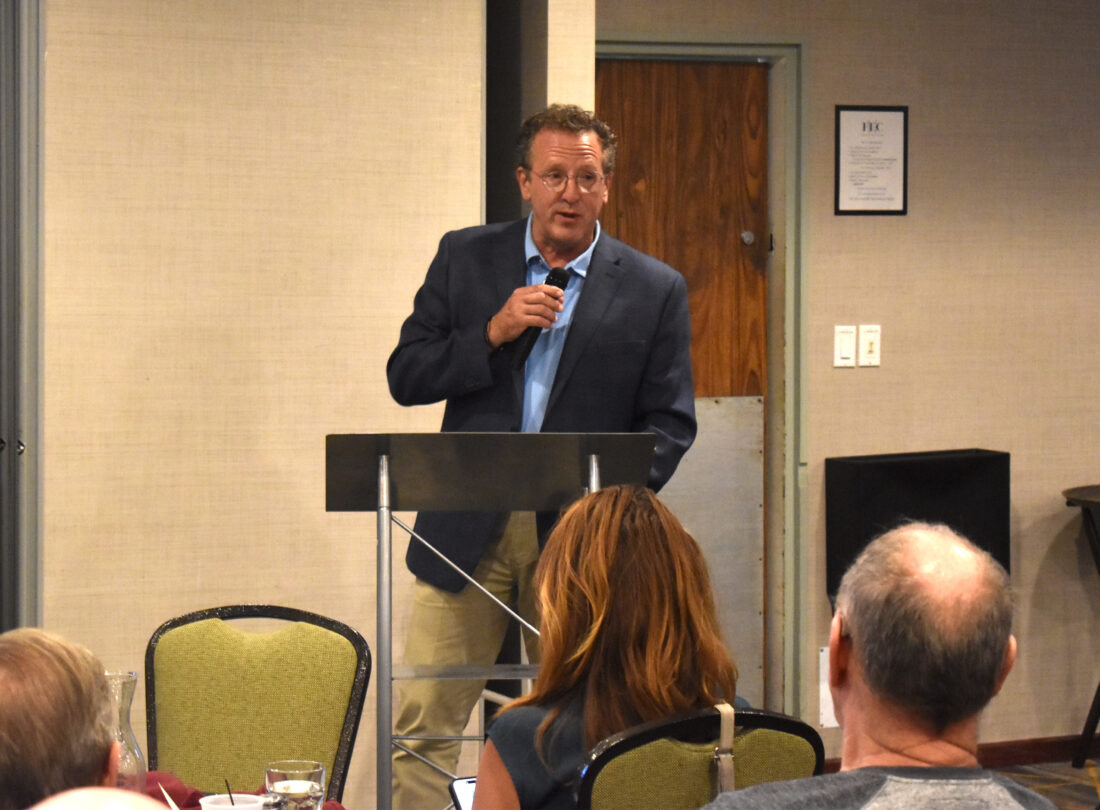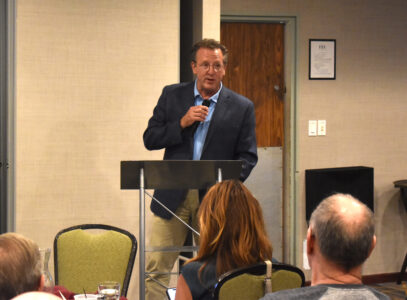Fairmont native recounts prison career journey for annual meeting

ABOVE: Fairmont native Blake Davis speaks on his background and time working through the American penal system during his speech at the Martin County Historical Society annual meeting on Thursday.
FAIRMONT – The Martin County Historical Society held its annual meeting on Thursday, inviting 1985 Fairmont High School graduate Blake Davis to speak about his experiences working through the American penal system.
Growing up in Fairmont, Davis said what he learned from his parents embodies what Fairmont is all about.
“They taught me the difference between right and wrong,” he said. “How to treat people with kindness, to have manners, to shake somebody’s hand firmly, look them in the eye, and speak up when you talk. They taught me hard work, treating people right, and caring for those around you is what’s important.”
Davis graduated from Gustavus Adolphus on a Friday, got married to his wife, Sandra, the next weekend, and moved across the country the week after that to Phoenix. There, he spent the first eight years of his career in the federal prison system after getting his degree in pre-law.
“You learn in a hurry,” Davis said. “You learn what to do and what not to do. You learn the value of depending on your teammates. You mature in a hurry when you’re put in situations.”
From correctional officer to case manager, Davis said he discovered during that eight-year period that being a warden was his big goal. He became a manager for a unit of around 250 prisoners in Safford, Arizona. After doing well there, he was sent to the Florence, Colorado Supermax, but in a slightly different position.
“I was at that time the media guy,” Davis said. “It was probably the coolest job I’ve ever had. You were the media guy when all the monsters in the world were at that facility. Every day, I would talk to people like Oprah and Larry King. They would all try to be interviewing the bombers and the monsters. I was able to manage and run strategic planning for that facility, and it was a super cool job.”
An attendee asked Davis what some of these more high-profile criminals were like to talk to. Davis said he met with Oklahoma City bomber Timothy McVeigh every day for around two years. Davis said, while what McVeigh did was horrible, in person, he was a very respectful, military-type guy who referred to him as “Mr. Davis.”
On the other hand, he said Ted Kaczynski was very cerebral. Davis said Kaczynski would receive calculus questions sent in by people in the mail.
“The guys that gave you the biggest problems in the prison weren’t the guys that you read about in the paper,” Davis said. “They were the heads of these gangs and the heads of the Mexican Mafia, the head of the Aryan Brotherhood, the head of the black Gangster Disciples, the heads of these Crips, Bloods, all the bad guys there.”
After successful stops as an assistant warden in Michigan and Rochester, Minnesota, and as Deputy Assistant Director for the Federal Bureau of Prisons in DC, Davis achieved his goal by becoming a warden at Federal Correctional Institution (FCI) Englewood.
While the facility was built in the 1930s, Davis said he was able to make several changes and make it shiny like a new penny. In doing so, Davis was sent to the Florence Supermax as the new warden.
“It was probably my most rewarding job that I’ve ever had,” he said. “Staff were very, very close. We worked as a unit. We worked as a team. We had everybody with one mission, and we were doing it the right way.”
Davis capped off his career with an assignment as Assistant Director of the Federal Bureau of Prisons and a stint as CEO of the GEO Group private prison corporation. Davis said the AD position was a different type of prison work because it involved more politicians and budgets. He said the biggest thing that impacted him there was the ability to effect change.
“If I wanted to be able to install this type of security measure or this use of gas in this situation, or anything, I had the ability to actually change it for the entire agency,” Davis said.
Going the private route, and being totally divested from it currently, Davis said private prisons do serve a very good purpose.
“The private sector can move and flex so quickly,” he said. “I know they do it for profit, but we were involved with a lot of state contracts, international contracts, and federal contracts. We did it better in a lot of ways than I had done it in the feds, and we had better results in a lot of ways.”
Looking back over his 30+ year career, Davis said Fairmont was instrumental in his progression and success.
“I think of the value of a small town, the family, the people, the work ethic that you learn, and from a place like this,” he said. “To me, [it’s] the education that you pick up in a school system like I had here in Fairmont, the teachers that really care, the coaches that I had. The stuff that I learned growing up in this small town was invaluable to me in business, and a lot of success, I say, the gift of working hard.”
The MCHS in its meeting also reported that funds increased from the last annual meeting to $210,000 from $180,000. MCHS Director Larry Tvedten presented a slideshow of the year in review, including several tours for visitors and area student groups, and highlighted Amy Klobuchar’s visit to the museum as part of her 87 county tour of Minnesota.



